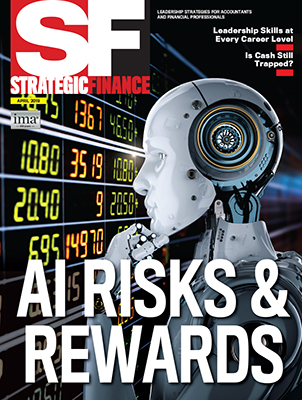Why do good people do bad things in the workplace? It’s a puzzling question. There are many examples of seemingly good-intentioned or previously ethical professionals suffering a lapse or committing some sort of misconduct or ethics violation. Friends, colleagues, and even family members can often be left wondering how the honest person they thought they knew could do such a thing. The question becomes even more poignant when it involves accounting and finance professionals running the risk of ruining their reputations by crossing an ethical boundary.
PRESSURE FROM MANAGEMENT
Diane Jules, deputy director of the International Ethics Standards Board for Accountants (IESBA), notes that professionals today increasingly operate in pressure situations, such as tight deadlines or an overbearing superior.
“The public is less sympathetic to professionals who do not have the courage to speak up or make tough calls,” Jules says. “Accountants are required to exercise professional judgment in making decisions and think about potential biases that may exist, as well as how their decisions would be viewed by others, for example, an investor or regulator.”
“One example of systemic pressure to violate ethics guidelines that has been very public is Wells Fargo,” notes Patricia Harned, CEO of the Ethics & Compliance Initiative (ECI). Top-down pressure from the bank’s management allegedly coerced rank-and-file employees to create millions of fraudulent credit card, savings, and checking accounts without clients’ consent.
“The company has been public about their realization that the incentives structure they had in place for employees in certain functions, combined with pressure to perform from management, resulted in the unintended consequence of incentivizing wrong behaviors,” Harned adds. “In such a scenario, well-intentioned people start cutting corners because they believe that everyone else is doing it. At Wells Fargo, they became aware that other people were getting raises and bonuses, and they were achieving their goals by creating fake accounts, so presumably well-intentioned people all started doing the same thing and it became the norm.”
EARNINGS MANAGEMENT
Pressure imposed on finance and accounting professionals to make financial statement numbers look better than reality is the primary cause of unethical earnings management, says Steven Mintz, a professor emeritus of accounting at California Polytechnic State University.
“No organization wants to go public and say they missed financial analysts’ earnings expectations,” Mintz adds.
“Sometimes otherwise ethical professionals will get caught up in a financial fraud because individuals can be limited in their ethical vision—or what’s known as boundedly ethical meaning. They may not recognize the ethical dimensions of their decisions, or they lack ethical awareness because they are subject to ethical blind spots or biases where their values are set aside or altered to go along with the company’s actions,” he explains.
For example, an otherwise ethical person might become involved in financial statement manipulation because a superior claims that it’s a onetime request. Failing to see that this is likely to be an empty promise creates a gap between what an ethical person may want to do and what they actually do.
“Once improper requests are accepted, it’s a short slide down the ethical slippery slope, where it becomes difficult to reclaim the moral high road if and when additional requests are made,” Mintz says. “Sometimes a superior might apply pressure to go along with financial wrongdoing and rationalize it to the accounting or finance professional by saying, ‘This is the way things are done around here’ or playing the loyalty card and making a veiled threat about losing a job.
“The professional being pressured might reason, ‘Who am I to question this higher-ranking official?’”
CONSIDER ETHICAL IMPLICATIONS
Just as the ignorance of laws or regulations isn’t an excuse, neither is a lack of awareness or a misunderstanding about applying ethical standards. “Unfortunately, what I’ve seen has generally been driven by misinformation about the professional ethical standards that apply and, in some cases, ignorance about the requirements,” says Cathy Allen, founder of Audit Conduct and a former managing director at PwC. “Part of the problem is that many accountants must keep up with myriad professional standards and government regulations, which have become more complex, and their understanding of current ethics standards may suffer for it.”
While most of us think of ourselves as ethical, our ethicality, like our rationality, is bounded, notes Eva Tsahuridu, a professor and industry fellow at RMIT University. Good people do act unethically, most often not because they consciously decided to do so but because they didn’t consider the ethical content or implications of the issue at hand, their duties to others, and the consequences of their actions, she explains.
Professionals are susceptible to self-interest and other biases. “Everyone thinks that they are ethical and objective and therefore don’t have to concern themselves about being tripped up by biases and conflicts of interest,” Tsahuridu says. “Professionals can and do act in ways that go against what they think they should do, their own values. They may be affected by the targets they have to meet or the behavioral expectations that are created by powerful others. Ethical blind spots explain why good people behave badly, and we need not only awareness and training but also data and evidence to deal with them.”
As Diane Jules notes, professional ethics involves the application of relevant knowledge, training, skills, and experience that takes into account the facts of the circumstances and the relationships that are involved. “Make the ethical decision-making process holistic—what do you need to think about to deal with any potential biases that may exist?” she asks. “You need to be aware of your own biases and how that might affect your professional judgment.”
IMA ETHICS HELPLINE
For clarification of how the IMA Statement of Ethical Professional Practice applies to your ethical dilemma, contact the IMA Ethics Helpline.
In the U.S. or Canada, dial (800) 245-1383. In other countries, dial the AT&T USA Direct Access Number from www.usa.att.com/traveler/index.jsp, then the above number.
The IMA Helpline is designed to provide clarification of provisions in the IMA Statement of Ethical Professional Practice, which contains suggestions on how to resolve ethical conflicts. The helpline cannot be considered a hotline to report specific suspected ethical violations.

April 2019



